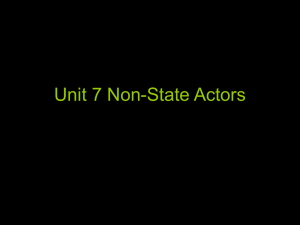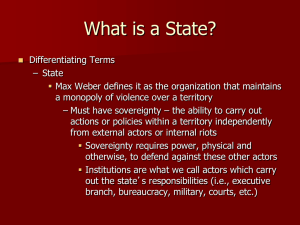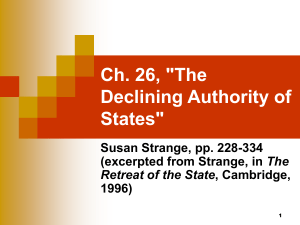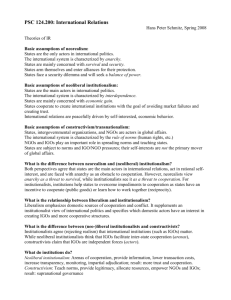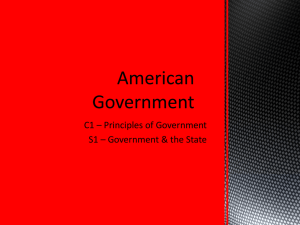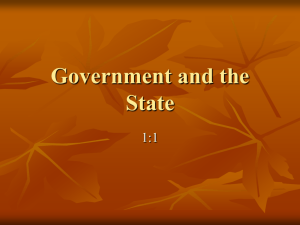state
advertisement
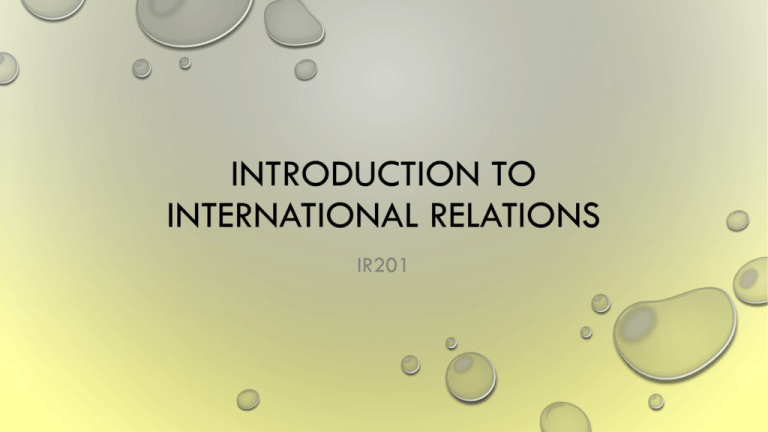
INTRODUCTION TO INTERNATIONAL RELATIONS IR201 BOOKS FOR THIS COURSE • Introduction to International Relations, Enduring Questions and Contemporary Perspectives by Joseph Grieco, G. John Ikenberry and Michael Mastanduno by PALGRAVE PUBLISHING IF THIS IS NOT AVAILABLE YOU COULD GET THE BOOKS BELOW: • Contemporary I.R, Framework for Understanding by Daniel Papp. PEARSON PUBLISHING • Readings in international relations for readings in international relations by Joshua Goldstein, Jon Pevehouse, Sandra Whitworth. PEARSON PUBLISHING GLOBAL POLITICS • Traditionally international relations is known as the study between states • However, in the last 30 years or so especially with the rise of globalization, international relations has opened up which also includes a range of other issues as well as other actors other than the states. • The word ‘global’ implies that politics must be considered in a world wide sense • Not only regional or national significance • Global issues includes: Environment Finance and Economics GLOBALIZATION • The emergence of a complex web of interconnectedness that means our lives are shaped by events that occur (and decisions that are made) at a great distance from us. • This trend towards global interconnectedness is the defining feature of recent decade. International Relations • What are we studying here? • International Relations (is also referred to as International Politics or International Studies) is an academic discipline • It is a sub discipline of political science • IR draws upon such diverse fields such as Economics History Sociology Politics and Law • IR is a description of events, relationships, trends etc in the real world What issues are studied in IR? • State sovereignty • Nationalism • International Security • Globalization • Terrorism • Economic Development • International finance Actors in International Relations • “THE WORLD IS A STAGE AND ALL THE MEN AND WOMEN MERELY PLAYERS” ~ WILLIAM SHAKESPEARE, • The main actors in International Relations States Intergovernmental Organizations (IGOs) Non Governmental Organizations (NGOs) Multinational corporations (MNCs) Individuals When did IR begin? • Based on the study of nation states • Traced back to 1648 Treaty of Westphalia Ended the 30 years religious war between Catholic and Protestants in Europe Modern state system was developed The concept of state sovereignty was developed Encouraged the rise of independent nation states IR tries to explain the actions. The ‘why’ WHAT IS THE BIGGEST PROBLEM WITH WORLD POLITICS? • Anarchical international system • One in which there is no central authority to set and enforce rules and resolve disputes. • This remains the main characteristic of world politics, but increasingly there is an alternative approach in evidence KEY INTRODUCTORY CONCEPTS • Politics Is about power (who rules and who is ruled) Defines the rules/laws under which people live It is linked to conflict and cooperation It is linked to the distribution of resources NATION • A nation is a group of people who share a set of characteristics. • At the core of the concept of a nation is the notion that people having commonalities owe their allegiance to the nation and to its legal representative, the state. • The recognition of commonalities among people spread with new technologies and education. With improved methods of transportation and invention of the printing press, people could travel, witnessing firsthand similarities and differences among peoples. ELEMENTS THAT CREATE A NATION • Regionalism Living and interacting in the same area This creates a sense of connection • Common language Creation of a national language – important aspect of nation building and nationhood ELEMENTS THAT CREATE A NATION • Common ethnicity – People who share the same culture, language and a common past. • Common religion This can be a rallying point for nationalism ELEMENTS THAT CREATE A NATION • Common history Sharing historical experiences Common past and the vision of common future • Nationalism This can be created through the process of nation building Using symbols like flags, national anthem to create and nurture love for one’s country NATION • According to Benedict Anderson, imagined communities: reflections on the origin and spread of nationalism ◦ “nation is an imagined community. Members of even the smallest nation will never know most of their fellow- members, meet them, or even hear of them, yet in minds of each lives the image of their communion…” WHAT IS A STATE? • Country = STATE • State has territorial boundaries • Sovereign - The monopoly on the use of legitimate force within a territory • A “state” is the sovereign entity of a territory • Please note: public violence is an illegitimate use of force national governments might delegate power - police, military - but the authority to use force originates from the state’s permission STATE • Max Weber (1948: 78) definition: A human community that successfully claims the monopoly of the legitimate use of physical force within a given territory. STATE • For an entity to be considered a state, four fundamental conditions must be met (although these legal criteria are not absolute): • a state must have a territorial base • A stable population must reside within its borders • There should be a government to which this population owes allegiance • A state has to be recognized diplomatically by other states STATE • Five basic social values of state: • I. Security • II. Freedom • III. Order • IV. Justice • V. Welfare SECURITY • Security • people generally assume that the state should and will guarantee the value of national security, which involves the protection of citizens from internal and external threat. • Being armed at least some degree state can both defend and threaten peoples’ security FREEDOM • Freedom personal and national freedom i.e. Independence. Government places taxes on citizens or obligations of military services which are part of the condition for preservation of national freedom. Peace and progressive change are most fundamental values of international relations. ORDER AND JUSTICE • Order & Justice States have a common interest in establishing and maintaining international order so that they can coexist and interact on a basis of stability, certainty, and predictability. International law, diplomatic relations and international organizations. WELFARE • Welfare Population’s socioeconomic wealth and welfare. People expect their government to adopt appropriate measures to encourage high employment, low inflation, steady investment, the uninterrupted flow of trade and commerce, etc. International economic environment NATION STATE • The nation-state, is the foundation for national self-determination, the idea that peoples sharing nationhood have a right to determine how and under what conditions they should live. • Other nations are spread among several states; in these cases, the state and the nation do not coincide. • It may be a state with several nations, like Indonesia. • In the case of the United States and Canada, the state and nation do not coincide, yet a common identity and nationality is forged over time, even in the absence of religious, ethnic, or cultural similarity. • In the United States, national values reflecting commonly held ideas are expressed in public rituals. NATION STATES AND CONFLICTS • Disputes over state territories and the desires of nations to form their own states have been major sources of instability and even conflict. • Of these territorial conflicts, none has been more intractable as the conflict between the Israeli Jews and Palestinian Arabs, who each claim the same territory. • Five interstate wars have been fought and two uprisings by the Palestinian people within the territory occupied by Israel have occurred since the formation of the state of Israel in 1948. • Should Israel and Palestinian territories be divided into two separate, independent states? CREATION AND DEVELOPMENT OF NATION STATES • The concept of nation states in International Relations emerged as a result of the Treaty of Westphalia 1648. • States and nation states were not the main actors before this treaty was signed • Europe before the Treaty of Westphalia consisted of feudal entities • Main authority was the Roman Catholic Church • At the smaller or micro level, authority centered on political units smaller than the states • Westphalian Treaty of 1648 recognized the sovereign rights of the states SOVEREIGNTY • Principle of supreme authority, reflected in the claim of a state to be the sole author of laws within its territory • In principle states recognize no higher authority • Authority – the legitimate right to influence others on the basis of an acknowledged duty to obey. WHAT IS A SOVEREIGNTY? • Sovereign entities are not supposed to interfere in the internal affairs of other sovereign entities • This is true in theory but in reality this is not always the case • Definition: the monopoly on the legitimate use of force within a territory • Sovereigns are expected to ensure their sub-state actors do not use force against foreign actors. • Sovereign states control their own domestic affairs. • Sovereign states do not intefere with internal issues in other states. • But states violate this rule all the time! VIOLATION OF SOVEREIGN RULE • Why do states violate the sovereign rule? Strong actors can violate sovereignty and get away with it They can do this because there is no punishment • Why is there no punishment? Anarchy WHAT IS ANARCHY? • Who is sovereign over the sovereigns? - No one • When there is crime within a state, the authorities like the police or the military will handle the situation. • However, in international politics there is no one or no institution to govern the behavior of states. • There is the UN. But states can still act according to their wishes and personal interests. VIOLATIONS OF SOVEREIGNTY • So far no actions have been taken on these violations: USSR in Afghanistan U.S attack on Iraq • The United Nations is not able to bring justice to many violations of sovereignty around the world. • Who are the permanent members of the United Nations Security Council? ANARCHY • Definition: the lack of overall political authority • In international relations, no one is sovereign over the sovereign • Anarchy is a world of “self-help” • Anarchy is NOT chaos most states are not fighting anarchy permits many different outcomes NON STATE ACTORS • Non state actors are non-sovereign entities that exercise significant economic, political, or social power and influence at a national, and in some cases international level. • The impact of non state actors is context-dependent, however. The roles they play, and the influence they exert, depend upon political, economic, and social context. NON STATE ACTORS 1. Intergovernmental organizations (IGOs) • a. Universal political organizations • b. Functional or limited-purpose organizations 2. Non-governmental organizations (NGOs) 3. Multinational or transnational companies (MNCs or TNCs) NON STATE ACTORS • Universal Political Organizations • Membership universal and purpose general For example the League of Nations and United Nations Functional Organizations Membership and scope as well as purpose is limited WTO, IMF, G7 Regional Organizations IGOs • Another group of important players is the intergovernmental organizations, or IGOs. Intergovernmental organizations are established by states, usually through a treaty. The most well-known IGO is the United Nations. Some other IGOs include the international atomic energy agency, international monetary fund, international criminal police organization, world bank group, and world trade organization. • Since IGOs only operate by the consent of states, states maintain their sovereignty. Moreover, most IGOs really don't have a means to enforce state compliance with their decisions, at least without the help of powerful states. • For example, since the United States is a permanent member of the UN's Security Council, along with China, Russia, France, and the United Kingdom, it can veto any substantive UN resolution. MNCS • Multinational corporations are major players on the world stage. They play a major role in the globalization process, which is the integration of communication systems, transportation systems, ideas, cultures and economies into one world system. • They are often more influential than many states. • A multinational corporation (MNC) is a business that operates and conducts business activities in more than one country. Sometimes the term multinational enterprise (MNE) is used, as not all international businesses are corporations. While you may think MNCs are a new creation, we can trace them back at least to the British East India company formed in 1600, which was shortly followed by the formation of the Dutch East India company formed in 1602. MNCs and TNCs • An MNC have investment in other countries, but do not have coordinated product offerings in each country. It is more focused on adapting their products and service to each individual local market. • A TNC, on the other hand, have invested in foreign operations, have a central corporate facility but give decision-making, R&D and marketing powers to each individual foreign market. NGOs • Nongovernmental organizations are important players. According to the United Nations, a nongovernmental organization (NGO) is a not-for-profit group, principally independent from government, which is organized on a local, national or international level to address issues in support of the public good. • NGOs focus on a broad range of issues, including human rights issues, humanitarian aid, economic development and social welfare, among others. Since NGOs are relatively independent of governments, they are not subject to the same types of political pressure to which states are often subject, such as turning a blind eye to torture for the sake of national security. • These organizations help fulfill the needs of people when their states cannot do so either because of indebtedness, economic underdevelopment, a recent natural disaster or corruption. Examples of goods and services provided by operational NGOs include providing financial aid or loans for economic development, providing medical care and even providing safe water, food and sanitation. EXAMPLES OF NGOs • The international committee of the Red Cross is focused on a humanitarian mission to protect and serve the needs of victims of war and international violence. It provides relief aid and also advocates for strengthening human rights law. • Doctors without borders, known through most of the world as médecins sans frontières, provides healthcare services and training to less developed and wartorn countries around the world. • Oxfam is an NGO that focuses on seeking an end to worldwide poverty. Some of its programs include providing food, water and sanitation services during natural disasters and trying to ensure A global food supply for the poor of the world.
